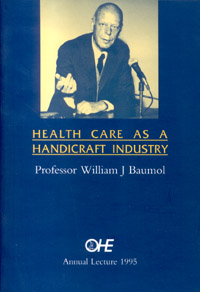Unlocking the Value of Combination Therapies

The seemingly inexorable rise in real health care costs (i.e. over and above the rate of inflation) has been a cause of great concern to governments throughout the world. Few economists in the world are better qualified than William Baumol to help us…
The seemingly inexorable rise in real health care costs (i.e. over and above the rate of inflation) has been a cause of great concern to governments throughout the world. Few economists in the world are better qualified than William Baumol to help us understand what is driving up real cost and how we can design a health care system that enables us to live with these cost increases.
His explanation – that the ‘handicraft’ nature of the technology of providing health care means it will inevitably have lower productivity growth than the economy overall — is more fundamental than the usual explanations offered of an ageing population, demand inducing new technology, and consumer pressure.
The argument is given added weight by the fact that it was his seminal research into relative price effects arising from differential productivity growth that first brought him to international attention more than 30 years ago. His view that the provision of health care can be made more competitive, so improving efficiency, will encourage many, as his theory of contestability, which first surfaced in the 1980s, has shaped modern economic thinking about industrial structure and competition. However, his thesis is that competition and greater efficiency will not fundamentally alter the relative productivity, and so cost, of health care. Society has to face up to the rising real costs of health care.
Professor Baumol’s solution will please many in the UK committed to a strong NHS. It is simply that we accept that spending on health care will rise as a share of national income. We must avoid the fiscal illusion of believing that we cannot afford to put up taxes in order to spend more on the NHS and other public services. Economic growth means that we can afford more of everything — private and public consumption.
However, in designing a health care system that will provide good health care for the whole population. Professor Baumol sets out some important attributes that will discomfort many supporters of the NHS. Drawing on his research during the US health care reform debate on the Clinton Plan, in which he participated as a strong supporter of plans to achieve universal coverage, he argues that publicly financed health care inevitably risks arbitrary cost cutting as politicians seek to keep taxes down. Far better to fund health care through a regulated private sector, with government as a residual purchaser for those who might otherwise be uninsured.
He also argues that good information can drive consumer choice and so make competition work, improving efficiency. Consumer choice must be constrained by co-payment, i.e. patients must pay something directly when visiting a doctor or obtaining a prescription medicine.
Of course this perspective reflects, in part, what is achievable in designing a health care system in the US. His views on the inevitability of rising real costs can be challenged as simplistic, and, of course, health care is not one production process or technology, but a bundle of technologies. Some of these may even be capable of productivity improvements that exceed the average for the economy. The evidence, however, suggests that the ‘handicraft’ effect has dominated and will continue to do so. Many of his points will give pause for thought to those on both sides of the UK debate about the NHS internal market. He suggests that information, choice and competition can improve efficiency, but there are limits. We should reconcile ourselves to spending more on health care as we become a richer nation and not penny pinch. We can afford it — the rising real cost of health care is a sign of our rising prosperity. In the long term, however, publicly funded health care may be cut. If taxes do not rise the choice is to design a privately financed system that provides high quality universal coverage, or to allow a publicly funded service to be steadily eroded.
I hope that readers will find this lecture gives them new insights into the health care financing debate and develops their thinking, whatever their economic and ideological perspective. My final, pleasurable, task is to thank Professor Baumol for delivering his stimulating paper at the 2nd OHE Annual Lecture on 5 April 1995, and to thank Lord Peston who chaired the lecture and subsequent discussion.
Health Care as a Handicraft Industry
Baumol, W.J.
(1995) Health Care as a Handicraft Industry. OHE Monograph. Available from https://www.ohe.org/publications/health-care-handicraft-industry/